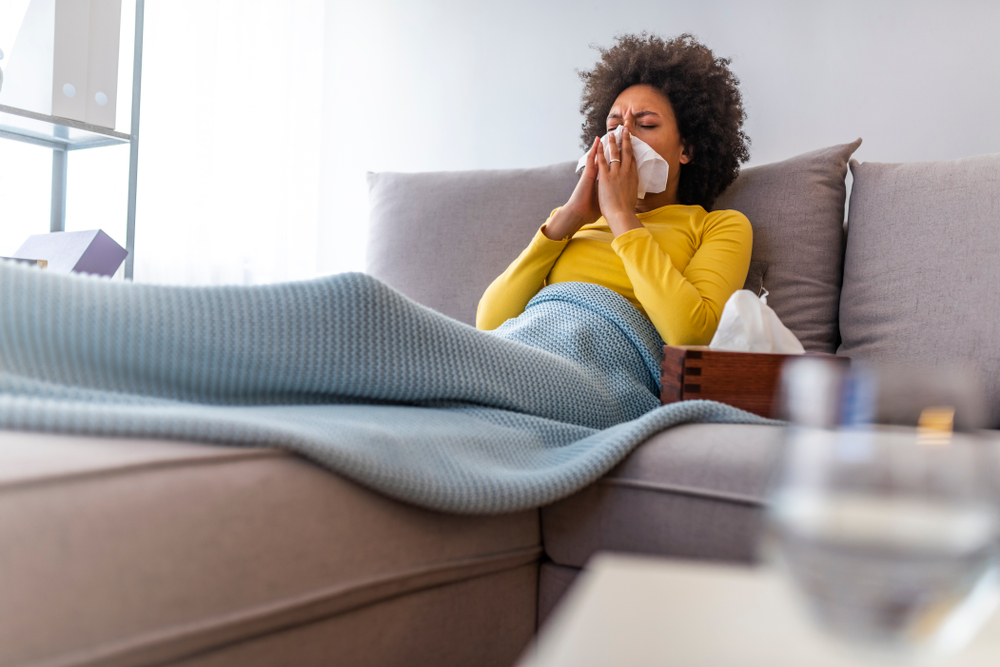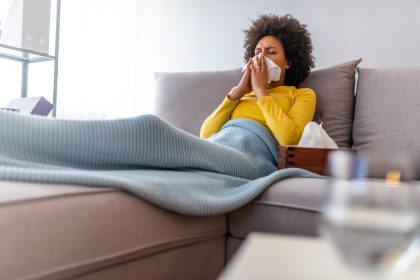The common cold strikes most adults two to three times annually, leaving millions searching for relief from the familiar symptoms of congestion, sore throat, and persistent coughing. While no cure exists for this viral infection, several evidence-backed strategies can significantly reduce symptom severity and duration.
How your immune system battles cold viruses
When cold viruses enter your body, they target the upper respiratory tract—particularly the mucous membranes lining your nose and throat. These viruses infiltrate healthy cells, hijacking cellular machinery to replicate themselves rapidly before spreading to neighboring cells.
Your immune system responds by deploying white blood cells that release inflammatory compounds, creating the classic cold symptoms we experience. This inflammatory response, while uncomfortable, represents your body actively fighting the infection.
Recovery timing varies, with most colds lasting between 7-10 days. The first 2-3 days typically bring the most intense symptoms before gradually improving as your immune system gains the upper hand against the viral invaders.
The truth about antibiotics and cold treatment
Perhaps the most important fact about cold treatment: antibiotics offer absolutely no benefit against cold viruses. These medications target bacterial infections exclusively and cannot affect viruses whatsoever. Taking antibiotics unnecessarily contributes to antibiotic resistance while providing zero symptom relief.
Despite this medical consensus, many people still request antibiotics for cold symptoms. This misunderstanding highlights the importance of focusing on evidence-based approaches that actually help manage cold symptoms effectively.
9 most effective cold-fighting strategies
- Prioritize hydration and rest
Adequate fluid intake remains one of the simplest yet most effective cold remedies. Proper hydration thins mucous secretions, making them easier to clear while preventing the headaches and fatigue that dehydration causes.
Water serves as the ideal hydration source, though warm liquids like herbal teas and broths offer additional benefits. These warm fluids soothe irritated throats while supplying necessary fluids and electrolytes.
Rest plays an equally crucial role in recovery. Sleep deprivation weakens immune function, potentially prolonging illness. Whenever possible, adjust your schedule to allow extra sleep when fighting a cold, as this gives your immune system optimal conditions for battling the infection.
- Try saline nasal irrigation
Nasal irrigation using saline solution effectively flushes viruses, irritants, and excess mucus from nasal passages. This mechanical cleansing reduces viral load while moisturizing dried nasal tissues and relieving congestion.
Options include neti pots, squeeze bottles, or pre-packaged saline sprays. When preparing solutions at home, always use distilled or previously boiled water to prevent introducing harmful organisms into sensitive nasal passages.
Many cold sufferers report significant congestion relief following saline irrigation, with benefits lasting several hours per treatment. For maximum effectiveness, perform irrigation several times daily, especially before sleep.
- Apply targeted humidity
Dry air exacerbates cold symptoms by further irritating already inflamed respiratory tissues. Humidifiers counter this by adding moisture to indoor air, particularly beneficial in winter months when heating systems reduce ambient humidity.
For direct symptom relief, steam inhalation provides concentrated moisture directly to irritated airways. Simply breathing steam from a hot shower or from a bowl of hot water (with a towel draped over your head) can temporarily reduce congestion and soothe irritated nasal passages.
When using humidifiers, clean devices regularly according to manufacturer instructions to prevent mold growth that could worsen respiratory symptoms.
- Optimize zinc timing
Zinc lozenges or syrups taken within 24 hours of initial symptoms may reduce cold duration by inhibiting viral replication in throat tissues. The effectiveness appears linked to direct contact between zinc and the affected mucous membranes.
For maximum benefit, begin zinc supplementation immediately when symptoms appear and continue according to product directions throughout the illness. Lozenges should dissolve slowly in the mouth rather than being chewed to maximize contact time with throat tissues.
Zinc nasal products should be avoided due to risk of permanent smell loss, while excessive oral zinc can cause nausea or interfere with copper absorption when used long-term.
- Consider vitamin C
While vitamin C supplementation doesn’t prevent colds in the general population, evidence suggests it may slightly reduce symptom duration and severity when taken during illness. The effect appears modest—shortening colds by approximately 8-14% in most studies.
Those facing intense physical stress or cold environments may experience more significant benefits from preventative vitamin C supplementation. For most people, moderate supplementation (500-1000mg daily) during a cold provides potential benefits with minimal risk.
Food sources rich in vitamin C include citrus fruits, kiwi, strawberries, bell peppers, and broccoli, though supplements provide more concentrated amounts during active infection.
- Harness honey’s properties
Honey demonstrates surprising effectiveness against cough symptoms, particularly in children over age one. Its thick consistency coats irritated throat tissues while its antimicrobial properties may provide additional benefits beyond symptom relief.
For cough suppression, two teaspoons of honey before bedtime outperformed placebo in research studies. Honey can be consumed plain, mixed into warm tea, or combined with lemon juice for additional vitamin C.
Due to risk of infant botulism, never give honey to children under one year of age. For older children and adults, however, honey provides a safe, drug-free option for nighttime cough relief.
- Try hot drinks and chicken soup
Hot liquids temporarily increase mucociliary clearance—the mechanism by which tiny hair-like structures sweep mucus from your respiratory tract. This enhanced clearance helps remove viruses and accumulated secretions more efficiently.
Chicken soup, long recognized as a cold remedy across cultures, combines several beneficial elements: warm liquid, electrolytes, easy digestibility, and compounds that may reduce inflammatory response. Research suggests chicken soup ingredients may collectively inhibit neutrophil migration, potentially reducing upper respiratory symptoms.
Other beneficial hot beverages include herbal teas, particularly those containing ginger, which may help reduce inflammation, or thyme, which functions as a natural expectorant helping clear mucus.
- Use targeted medication wisely
Over-the-counter medications can provide temporary symptom relief when used appropriately:
Decongestants reduce nasal passage swelling, improving airflow. Available as oral medications or nasal sprays, they work effectively for short-term use. Nasal spray decongestants should not be used beyond 3 consecutive days to prevent rebound congestion.
Pain relievers like acetaminophen or ibuprofen help manage sore throat pain, headache, and fever. Ibuprofen and other NSAIDs additionally reduce inflammation but should be taken with food to prevent stomach irritation.
Cough suppressants containing dextromethorphan help control persistent dry coughs, particularly valuable for enabling sleep. These medications address the symptom rather than the underlying cause but can significantly improve comfort.
Antihistamines in some cold formulations may reduce runny nose symptoms and improve sleep through their sedative effects, though they don’t address the core cold mechanism.
Read medication labels carefully to avoid doubling ingredients when taking multiple products, and consult healthcare providers for guidance if managing other health conditions.
- Employ salt water gargling
Salt water gargling reduces throat pain and inflammation through several mechanisms: drawing fluid from inflamed tissues, loosening mucus, and creating an environment less hospitable to viral replication.
For maximum effectiveness, gargle with a solution of ¼ to ½ teaspoon salt dissolved in 8 ounces of warm water several times daily. The warmth soothes irritated tissues while the salt provides the therapeutic effect.
This simple remedy costs almost nothing, carries virtually no risk, and provides immediate temporary relief for one of the most bothersome cold symptoms.
Preventive measures worth adopting
Beyond treating active symptoms, preventing cold transmission remains vital:
Hand hygiene significantly reduces viral spread. Wash hands thoroughly with soap and water for at least 20 seconds, especially after public outings or contact with sick individuals. When soap isn’t available, alcohol-based hand sanitizers provide an effective alternative.
Sleep sufficiency boosts immune function significantly. Consistently sleeping 7-9 hours nightly correlates with improved resistance to cold viruses and reduced illness severity when infections occur.
Stress management practices support immune competence. Chronic stress elevates cortisol levels, potentially impairing immune response to viral challenges. Regular exercise, meditation, adequate sleep, and social connection all contribute to stress reduction.
Proper nutrition supports immune function through multiple mechanisms. Diets rich in colorful fruits and vegetables, adequate protein, healthy fats, and limited processed foods provide the micronutrients necessary for optimal immune cell production and function.
When to seek medical attention
While most colds resolve without medical intervention, certain symptoms warrant professional evaluation:
Fever exceeding 101.3°F (38.5°C) in adults or any fever lasting more than three days Severe headache, especially with neck stiffness Shortness of breath or significant chest pain Symptoms worsening after initial improvement Symptoms persisting beyond two weeks Extreme throat pain interfering with fluid intake
These symptoms may indicate complications or secondary infections requiring specific treatment. Those with underlying conditions like asthma, COPD, or compromised immune systems should maintain lower thresholds for seeking medical care when respiratory symptoms develop.
While the common cold remains an inevitable part of life for most people, these evidence-based strategies can significantly reduce symptom burden and potentially shorten illness duration. By combining these approaches while allowing adequate rest, you provide your immune system the optimal conditions for effectively clearing the viral infection.







